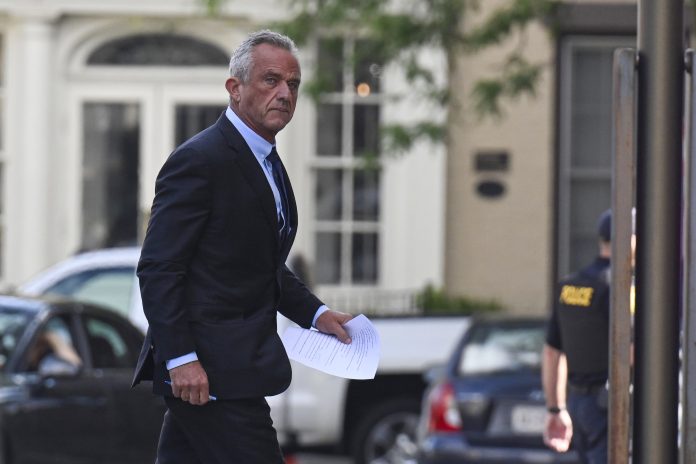Robert F. Kennedy Jr.’s independent presidential campaign faced a setback this week when a New York judge invalidated his petition to appear on the state ballot, a ruling that could pose challenges for his campaign in other states.
Kennedy’s legal team quickly filed an appeal Wednesday against the decision by Justice Christina Ryba. The judge determined that the address Kennedy listed on his nominating petitions was a “sham” location, used solely to maintain his voter registration and further his political ambitions. The challengers argued that Kennedy’s actual residence was in Los Angeles, where he lives with his wife, “Curb Your Enthusiasm” actor Cheryl Hines.
New York is just one of over a half-dozen states where Democrats and their allies have contested Kennedy’s petitions. Some challenges claim he falsely listed the same New York address under scrutiny in the current litigation, while others raise issues with the validity of petition signatures.
In Pennsylvania, challengers argue that Kennedy’s paperwork incorrectly lists the same New York address, and that both he and his running mate showed a “fundamental disregard” for state laws governing the petition process. Kennedy’s attorney dismissed the challenge as baseless. A court in Harrisburg will hold an evidentiary hearing on the matter next Tuesday.
Kennedy’s campaign insists it has gathered enough signatures to secure ballot access in all 50 states and has officially qualified in 17 of them. His candidacy has raised concerns across the political spectrum, with both Democrats and Republicans wary that he could draw votes away from their respective candidates.
National Democrats have been particularly active in undermining Kennedy’s campaign, while former President Donald Trump, the Republican nominee, has oscillated between criticizing Kennedy as too liberal and courting his endorsement or that of his supporters.
What happened in New York?
The ruling followed a brief trial in state court, where the issue was whether Kennedy had falsely listed a New York residence on his state nominating petitions. Kennedy claimed to rent a room in Katonah, New York, but testified that he moved to California a decade ago to be with his wife, with the intention of eventually returning to New York, where he is registered to vote.
The lawsuit, supported by Democrat-aligned Clear Choice Action, argued that Kennedy’s true residence is in Los Angeles. Justice Ryba concluded that using a friend’s address for political purposes, while spending minimal time there, does not meet the residency requirements under New York’s Election Law.
Kennedy responded to the ruling by criticizing the current Democratic Party, saying it no longer resembles the party of his father and uncle, which he believes was committed to expanding voter rights and promoting competition in elections. His legal team also plans to seek federal injunctive relief in New York City, arguing that the 12th Amendment to the U.S. Constitution protects the rights of qualified individuals to run for president, even if they need to live temporarily in another state for work.
What might this mean for other states?
Legal experts suggest that the outcome of Kennedy’s appeal in New York could influence similar challenges in other states. The U.S. Constitution grants individual states broad authority to regulate elections, and some states have strict requirements for independent candidates seeking ballot access.
Keith Gaddie, a political science professor at Texas Christian University, noted that states with similar criteria to New York might use this ruling as a basis to disqualify Kennedy. While it may not happen everywhere, it’s likely to occur in other states.
Kennedy acknowledged after the trial in Albany that a loss in New York could lead to additional lawsuits in other states. Clear Choice Action claims Kennedy used the same New York address on petitions in 17 other states.
However, Richard Winger, editor of Ballot Access News and a supporter of minor party ballot access, expressed skepticism that the New York ruling would trigger new challenges in other states, arguing that objections are typically based on specific criteria already outlined in state laws.
Where else has Kennedy faced challenges?
Kennedy’s candidacy has been contested in several states, including Hawaii, Nebraska, New Jersey, and Washington, with issues ranging from his listed address to the signatures required to qualify for the ballot.
The Democratic National Committee is supporting challenges to Kennedy’s petitions in Nevada, Delaware, and Georgia. Hearings on these challenges will begin Monday in Georgia, where Democrats allege Kennedy’s petitions are invalid due to errors in their completion. Kennedy’s campaign disputes these claims.
Clear Choice Action is also backing challenges in Illinois, Pennsylvania, and Texas. In Texas, the group’s attorney argued that Kennedy’s New York address does not meet state election law requirements and should invalidate his candidacy.


